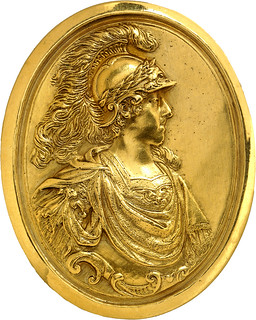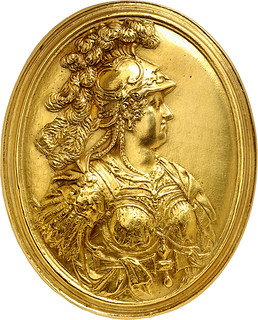
PREV ARTICLE
NEXT ARTICLE
FULL ISSUE
PREV FULL ISSUE
V25 2022 INDEX E-SYLUM ARCHIVE LOUIS XIII GOLD MEDALLIONA unique gold medallion of Louis XIII is offered in the June 3-4 MDC Monaco auction. Here's a standalone article I excerpted from the press release. An amazing piece of work. See the earlier article for more information on the sale. -Editor
Lot 458.
Obv. Bust of Louis XIII facing right, cuirassed, draped, wearing a plumed parade helmet and laureated [as Mars], on a kind of finial. Rev. Bust of Marie de' Medici faceving right, cuirassed, draped, wearing a plumed parade helmet [as Pallas-Athena or Minerva]. Maz.- - Rouyer cf. XXVII/1 = BnF Paris L.2562 (bronze) = RN, 1892, p.491-496 = coll. P. Rattier (Rollin et Feuardent, 13th -14th april 1891, n° 71) = coll. B. Fillon (Rollin et Feuardent, 20th-24th march 1882, n° 165) - RN, 1990, p.232-253 [L. Smolderen - à propos de Guillaume Dupré] ; Gold - 86,10 g - 46,2 x 57 mm - 12 h. Very high quality cast, with high reliefs re-chiseled by the artist himself and polished fields. The obverse and reverse listels have been processed differently. Unique and, more than a medal, a true piece of art. Almost Uncirculated. Price: 150000 € This exceptional medallion (term we prefer compared to medal) is an unedited gold cast. This medallion is only known in bronze by the unique example of the Cabinet des médailles of the BnF in Paris, composed of two bronze plaques united in a brass frame with a bail. This bronze medallion of 47 x 58 mm, was acquired during the sale of Paul Rattier's cabinet (Rollin et Feuardent, 13th-14th of april 1891, n°165) and was previously a part of Benjamin Fillon's collection (Rollin et Feuardent, 20th-24th of march 1882, n°165). This bronze cast was represented in the Fillon's collection sale catalogue [Rollin et Feuardent, 20th-24th of march 1882, n°165], in the Revue numismatique of 1892, p. 491-492 (etching) and also in Les médailleurs… by Natalis Rondot, pl. XXVII n°1.
According to Henri de la Tour, in the Revue numismatique of 1892, p. 491 to 496, the Cabinet des médailles bronze cast,
Our example, like the bronze cast of the Cabinet des médailles, can be linked to another medal dated 1603, with no signature and still not found, only known by an intaglio made by the famous engraver Sébastien Leclerc (1637-1714), author of Médailles sur les principaux évènements du règne de Louis le Grand. This intaglio represents the bust of Marie de' Medici facing left, wearing a helmet and cuirassed, with the legend A MIS ICI REMEDDE MDCIII (anagram of MARIE DE MEDICIS 1603) [S. Leclerc, Monnaies et médailles…, pl. VIII n°2]. On the same page, board VIII n°3, is our oval medallion representing Marie de' Medici. Whereas Marie de' Medici's portrait might be idealized considering the age of the Queen-mother, we think that the king's one is pretty accurate. The beardless face combined with his early middle age representation leads us to think, like Henri de la Tour in the Revue numismatique of 1892, that the engraving of the royal portrait has been realized in the 1620's and certainly before 1623. There are very few events justifying the representation of a warrior king and a Marie de' Medici depicted as Pallas Athena (or Minerva), goddess of wisdom, intelligence and military strategy, but also symbol of Regency. Our medallion has to be posterior to the Treaty of Angoulême (30th april 1619) ending conflict between Louis XIII and his mother, consolidated on the 5th of september 1619 by the public reconciliation of Tours. On the 24th of December 1620, Protestants decide to take up arms after the La Rochelle's assembly. From 1620 to 1622, a military operation is carried out against Protestants of La Rochelle. Our medallion could symbolize the common policy adopted by the Queen-mother and her son to face the beginnings of the protestant revolt of La Rochelle ? Louis XIII, as the war chief, and Marie de' Medici, as Pallas-Athena or Minerva, goddess of wisdom and military strategy, could show the unity between the King and the Queen-mother facing the protestant threat and fighting it together.
The artist of our unsigned medallion is unknown. Some careful comparisons with Italian medals of the second half of
the XVIIth century made by Henri de la Tour in the Revue numismatique of 1892, p.495, demonstrate a clear transalpine
influence. Rouyer quotes de la Tour in a comment about a medallion belonging to Jacob Richier and says
Guillaume (1576-1643) is a sculptor since 1597, trained by his father-in-law Barthélémy Prieur. He becomes first
King's sculptor in June 1611, general controller of French coins' hallmarks and effigies in October 1601 jointly with
Jean Pillon, then alone in 1617. He is also general commissioner of artillery around 1629. His work is essentially
composed of portraits ; some of his medals are uniface. He is a fantastic portraitist with a taste for opulent reliefs. Despite
the event it seems to be connected with, our medallion is more than a medal, it is a piece of art worthy of the greatest
artists of his time. Let's quote Rouyer one more time :
Consulted works :
LA TOUR (H. DE).- Médailles modernes récemment acquises par le Cabinet de France. VI/. Louis XIII et Marie de Médicis.- Revue numismatique.- 1892.- p. 491-496, fig. JOMBERT (Ch.-Ant.).- Catalogue raisonné de l'œuvre de Sébastien Leclerc. Partie 1.- Paris : l'Auteur, 1774. LECLERC (S.).- Monnaies et médailles relatives à l'histoire de France, de Charles VII à Louis XIII.- Miscellany of XI boards, XVIIth siècle. SMOLDEREN (L.).- À propos de Guillaume Dupré.- Revue numismatique.- 1990.- p. 232-253, pl. ee MAZEROLLE (F.).- Les médailleurs français, du XV siècle au milieu du XVII .- 3 volumes.- Paris : Imprimerie nationale, 1902-1904.
To read the earlier E-Sylum article, see:
Wayne Homren, Editor The Numismatic Bibliomania Society is a non-profit organization promoting numismatic literature. See our web site at coinbooks.org. To submit items for publication in The E-Sylum, write to the Editor at this address: whomren@gmail.com To subscribe go to: https://my.binhost.com/lists/listinfo/esylum All Rights Reserved. NBS Home Page Contact the NBS webmaster 
|


